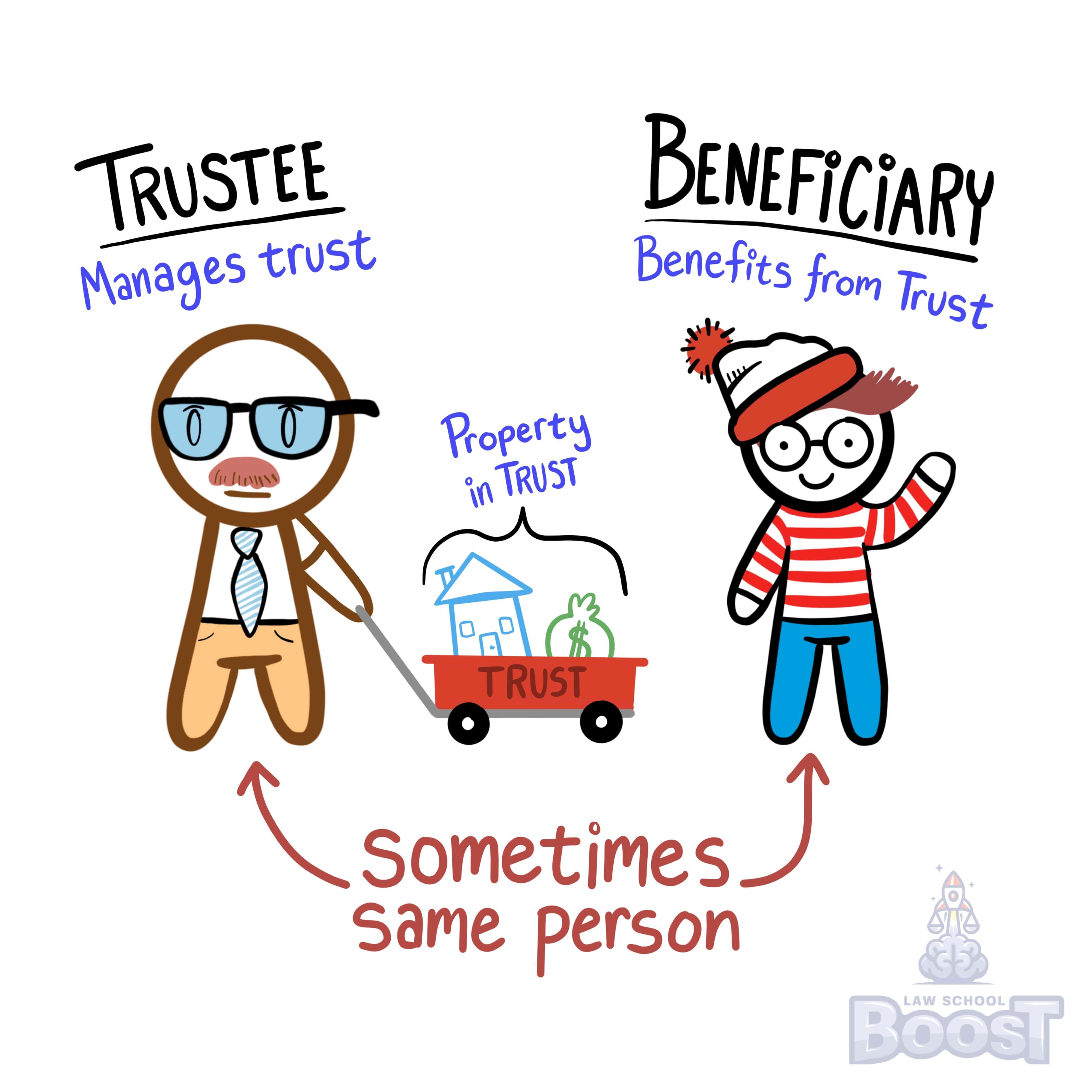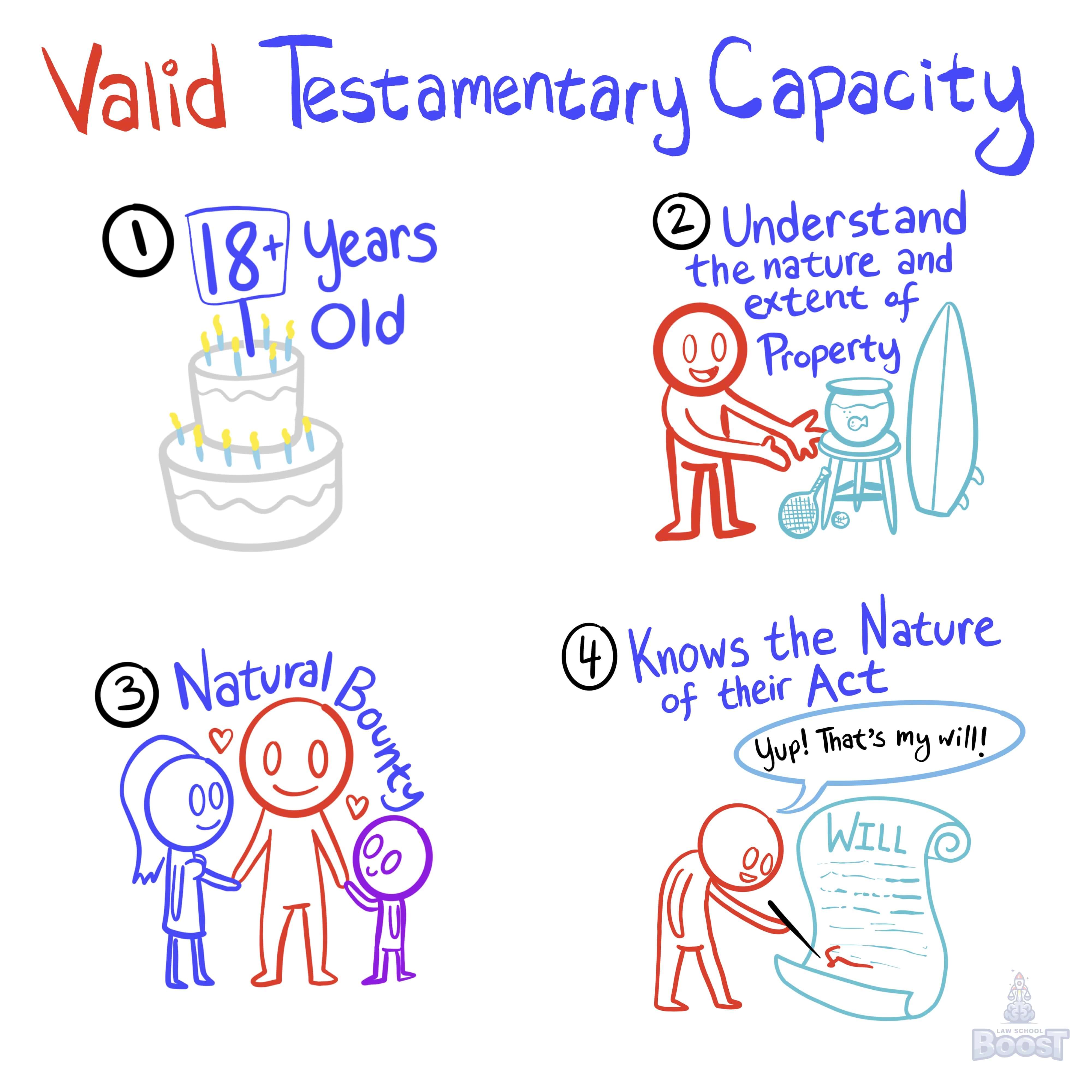🥺
Trusts • Express Private Trusts
TRUSTS#004
Legal Definition
The same grounds for invalidating a will due to lack of testamentary capacity also apply to trusts: (1) undue influence; (2) insane delusions; (3) fraud; and (4) mistake.
Plain English Explanation
"Testamentary capacity" is the mental ability of a person to make a will or trust. In other words, if someone doesn't genuinely intend to create a trust, then the trust is not valid. Four of the common ways someone may lack testamentary capacity are:
(1) Undue influence is influence by which a person is induced to act otherwise than by their own free will or without adequate attention to the consequences. In other words, it means someone was pressured or manipulated in a way to do something they didn't want to do.
(2) Insanity affects someone's mental ability, and thus can invalidate a trust.
(3) Fraud happens when someone is manipulated, which means their actions do not reflect their actual, genuine interests.
(4) If someone makes a mistake, then the mistake doesn't actually reflect their wishes.
(1) Undue influence is influence by which a person is induced to act otherwise than by their own free will or without adequate attention to the consequences. In other words, it means someone was pressured or manipulated in a way to do something they didn't want to do.
(2) Insanity affects someone's mental ability, and thus can invalidate a trust.
(3) Fraud happens when someone is manipulated, which means their actions do not reflect their actual, genuine interests.
(4) If someone makes a mistake, then the mistake doesn't actually reflect their wishes.
Hypothetical
Hypo 1: Bob is 95 years old and showing signs of dementia. His son Timmy moves in with Bob and convinces him to create an irrevocable trust leaving all his money to Timmy when he dies. Timmy claims he is doing this to help protect Bob's assets, but in reality Timmy wants to make sure he inherits all of Bob's money. Result: Even though Bob signed the trust papers, because he was showing diminished mental capacity at his advanced age, combined with Timmy's undue influence in getting him to sign, a court would likely invalidate Bob’s trust due to his lacking capacity.
Hypo 2: Bob creates a trust that leaves all his possessions to his cat Nibbles when he dies. Bob has multiple living relatives, but believes that his cat loves him unconditionally, unlike most humans. Result: Bob's preference to leave all his assets to his cat could be considered an "insane delusion." Though it is possible to set up pet trusts that carefully plan for the care of an animal after death, a trust that provides a large amount of cash to a cat is likely something that would provide a trustee valid grounds under this rule to invalidate Bob's trust due to incapacity.
Hypo 3: Sam manages a bank and creates a legitimate-looking trust for Bob to sign that supposedly has favorable tax benefits. However, the trust actually transfers all of Bob's assets to Sam upon Bob's death. Sam never explains this to Bob. Believing the documents to be legitimate due to Sam's position, Bob signs the paperwork without reading it. Result: Sam committed fraud by misleading Bob about what he was signing. A court would invalidate this trust for lacking the requisite capacity and awareness of its actual terms.
Hypo 4: Bob enters into a trust with Sam to transfer ownership of Bob's café to Sam when Bob retires in 5 years. However, the paperwork mistakenly transfers ownership immediately. Despite the error, Sam takes over the café the next day. Result: This was a clear mistake in documenting the trust’s terms, rendering the trust invalid. Sam cannot take ownership until the timeframe originally agreed to by Bob.
Hypo 5: Bob creates a trust that passes his assets to his nephew after his death. While Bob indeed dislikes his nephew, he created the trust with the hope that his nephew would reform. The trust is entered into freely, thoughtfully and with sound mental health and intentions. Result: Bob created this trust knowingly and appropriately, with full capacity. The reasons behind Bob's decision to choose his nephew do not invalidate the trust or his ability to enter into it, even if those reasons seem peculiar or questionable.
Hypo 2: Bob creates a trust that leaves all his possessions to his cat Nibbles when he dies. Bob has multiple living relatives, but believes that his cat loves him unconditionally, unlike most humans. Result: Bob's preference to leave all his assets to his cat could be considered an "insane delusion." Though it is possible to set up pet trusts that carefully plan for the care of an animal after death, a trust that provides a large amount of cash to a cat is likely something that would provide a trustee valid grounds under this rule to invalidate Bob's trust due to incapacity.
Hypo 3: Sam manages a bank and creates a legitimate-looking trust for Bob to sign that supposedly has favorable tax benefits. However, the trust actually transfers all of Bob's assets to Sam upon Bob's death. Sam never explains this to Bob. Believing the documents to be legitimate due to Sam's position, Bob signs the paperwork without reading it. Result: Sam committed fraud by misleading Bob about what he was signing. A court would invalidate this trust for lacking the requisite capacity and awareness of its actual terms.
Hypo 4: Bob enters into a trust with Sam to transfer ownership of Bob's café to Sam when Bob retires in 5 years. However, the paperwork mistakenly transfers ownership immediately. Despite the error, Sam takes over the café the next day. Result: This was a clear mistake in documenting the trust’s terms, rendering the trust invalid. Sam cannot take ownership until the timeframe originally agreed to by Bob.
Hypo 5: Bob creates a trust that passes his assets to his nephew after his death. While Bob indeed dislikes his nephew, he created the trust with the hope that his nephew would reform. The trust is entered into freely, thoughtfully and with sound mental health and intentions. Result: Bob created this trust knowingly and appropriately, with full capacity. The reasons behind Bob's decision to choose his nephew do not invalidate the trust or his ability to enter into it, even if those reasons seem peculiar or questionable.
Visual Aids




